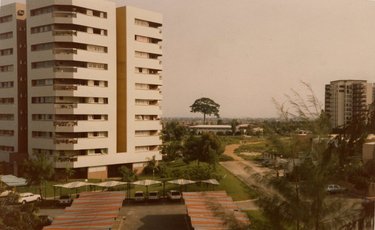Spirit prevailed in multicultural holiday
— Photo from Elizabeth Zunon
“This was our neighborhood in Abidjan,” says author Ellen Zunon. The modern skyscrapers in the tropical Ivory Coast of Africa are a far cry from the quintessential snow-covered scenes of a quaint New England Christmas, and yet the Zunons had one of their most memorable holiday celebrations there.
When I hear people express annoyance about the greeting “Happy Holidays” rather than “Merry Christmas,” I think back to the last holiday season I spent in the Ivory Coast, my husband’s native country.
We moved there shortly after our marriage, and at first I didn’t feel the urge to have a Christmas tree in the tropics. But, after our children were born, I decided that I would like to share my family holiday traditions with them. That meant colorfully wrapped packages under an evergreen tree, and loads of Christmas goodies.
My mother always made a half-dozen different kinds of Christmas cookies, but I attempted only one variety, with mixed results. Rolling out dough to make tree- and star-shaped cookies was not easy in the 90-degree heat and 90-percent humidity of the equatorial climate. My dough began to resemble the drooping clocks in Salvador Dali’s “Persistence of Memory,” but the children and I persisted, adding an extra dose of flour to stiffen the gooey dough.
In 1996, our last holiday season in the Ivory Coast, my family and I were invited to share Christmas Eve dinner with our friends Katy and Ismael (not their real names). Katy was from Mexico, but of Hungarian Jewish descent; her husband was Muslim, from the north of Ivory Coast. We had become close friends since we lived in the same neighborhood, and our children played together regularly. Differences of religion did not impede our friendship.
Earlier in December, Katy had invited me to take part in the lighting of the first candle of her menorah, as the first night of Hanukkah fell on the day after my birthday.
If you can picture the four of us, as Christmas approached, traipsing off together to buy Christmas trees, sweating profusely, you have a pretty accurate picture of that phase of our preparations.
As often happens during the holiday season, memories of Christmases past filled my mind. But a white Christmas in Sub-Saharan Africa does not consist of snow, instead a white dust fine as talcum powder blows down from the desert, wafted by the harmattan wind.
In Francophone countries, store windows are decorated, not with pictures of plump Santas, but of a slim “Père Noël.” French Christmas songs, most often Tino Rossi’s “Petit Papa Noël,” fill the air.
Christmas Eve finally arrived, and my husband, daughter, son, and I wearily carried our gifts and cookies up seven flights of stairs to Katy and Ismael’s apartment, the elevator being out of order. I cradled a bottle of sparkling wine, careful not to drop it in the dark staircase.
The view from their balcony was well worth the effort: the twinkling stars and lights of the city were both reflected in a shimmering lagoon. Although we could not see them, in a nearby village, residents gathered in front of a living crèche before midnight Mass. In the living room of the apartment, an evergreen stood in a corner, its brightly colored lights adding to the festive atmosphere.
And so there we were, a Catholic, a Protestant, a Muslim, and a Jew, sitting around the dinner table with our children, sharing a meal of Mexican molé and margaritas. It may seem an unlikely scene, but this ecumenical gathering stands out in my mind as one of the most memorable holiday celebrations I’ve had the privilege of attending.
It embodies the spirit of caring and sharing; not just tolerance, but respecting one another’s religious beliefs and traditions, which seems all the more important in today’s fractured world.
This year, the first evening of Hanukkah falls on Thanksgiving Eve. I might just call Katy (now in Mexico City) on Thanksgiving to wish her a “Happy Holiday.”
